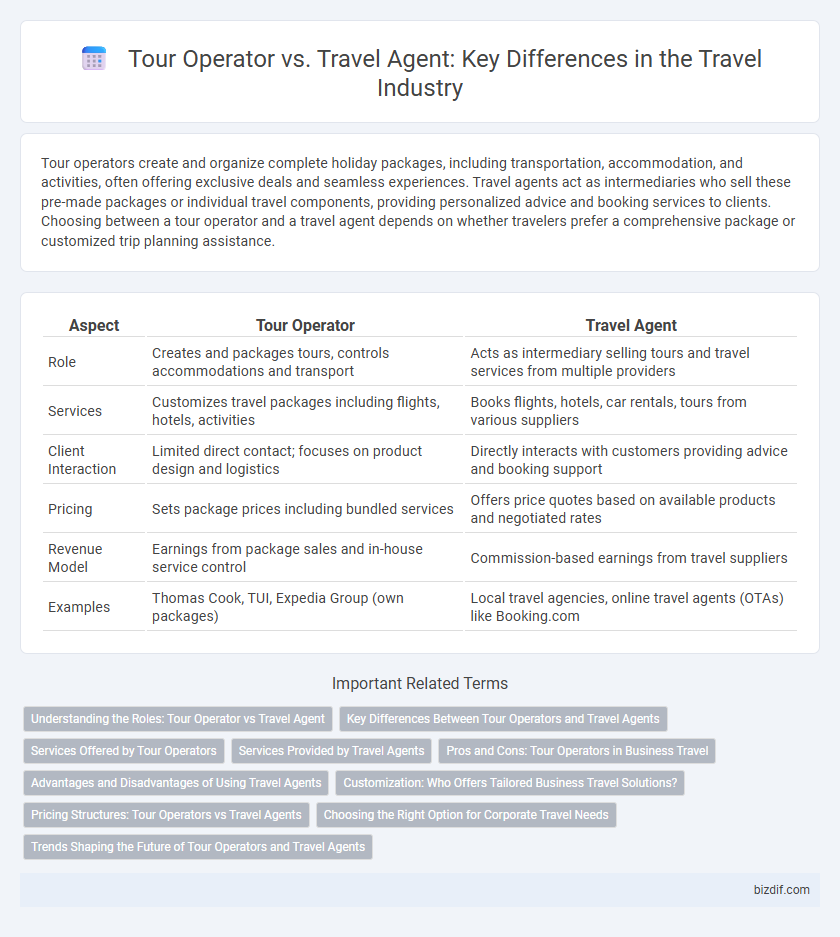Tour operators create and organize complete holiday packages, including transportation, accommodation, and activities, often offering exclusive deals and seamless experiences. Travel agents act as intermediaries who sell these pre-made packages or individual travel components, providing personalized advice and booking services to clients. Choosing between a tour operator and a travel agent depends on whether travelers prefer a comprehensive package or customized trip planning assistance.
Table of Comparison
| Aspect | Tour Operator | Travel Agent |
|---|---|---|
| Role | Creates and packages tours, controls accommodations and transport | Acts as intermediary selling tours and travel services from multiple providers |
| Services | Customizes travel packages including flights, hotels, activities | Books flights, hotels, car rentals, tours from various suppliers |
| Client Interaction | Limited direct contact; focuses on product design and logistics | Directly interacts with customers providing advice and booking support |
| Pricing | Sets package prices including bundled services | Offers price quotes based on available products and negotiated rates |
| Revenue Model | Earnings from package sales and in-house service control | Commission-based earnings from travel suppliers |
| Examples | Thomas Cook, TUI, Expedia Group (own packages) | Local travel agencies, online travel agents (OTAs) like Booking.com |
Understanding the Roles: Tour Operator vs Travel Agent
Tour operators design and package complete travel experiences by arranging transportation, accommodations, and activities, often selling these as bundled tours directly to customers or through travel agents. Travel agents act as intermediaries who sell travel products from various operators, offering personalized advice and booking services tailored to individual client needs. Understanding these distinct roles helps travelers choose the right service for seamless trip planning and better value.
Key Differences Between Tour Operators and Travel Agents
Tour operators create, package, and sell complete travel experiences, including transportation, accommodation, and activities, while travel agents primarily act as intermediaries who sell and arrange travel products on behalf of multiple suppliers. Tour operators often control pricing and product availability by negotiating directly with service providers, whereas travel agents provide expert advice, customized itineraries, and booking support to individual travelers. Understanding these roles helps customers choose the right service for comprehensive travel planning or personalized travel purchase assistance.
Services Offered by Tour Operators
Tour operators package and organize comprehensive travel services including transportation, accommodation, guided tours, and activities, creating seamless travel experiences for customers. They often negotiate bulk deals with hotels and airlines, offering competitive pricing and exclusive itineraries unavailable through individual bookings. The curated nature of these packages ensures convenience and expert planning for travelers seeking structured or specialized trips.
Services Provided by Travel Agents
Travel agents specialize in personalized itinerary planning, booking flights, accommodations, and exclusive local experiences, providing tailored travel advice and support. They often offer package deals and handle all transaction logistics, ensuring seamless coordination between clients and service providers. Their expertise extends to managing travel documentation, insurance options, and after-sales customer assistance, enhancing the overall travel experience.
Pros and Cons: Tour Operators in Business Travel
Tour operators in business travel offer comprehensive packages that simplify corporate trip planning by bundling transportation, accommodation, and meeting arrangements, ensuring cost efficiency and streamlined logistics. However, their standardized offerings can limit flexibility for tailored itineraries and may not accommodate last-minute changes as effectively as travel agents. Relying on tour operators can reduce administrative burdens but may restrict personalized services and negotiations that travel agents typically provide.
Advantages and Disadvantages of Using Travel Agents
Travel agents offer personalized service by tailoring travel plans to individual preferences and provide expert advice on destinations, accommodation, and transportation, ensuring a smoother booking process. However, using travel agents may involve higher fees and limited access to last-minute deals compared to direct online bookings or tour operators. Their deep industry knowledge can mitigate travel risks and offer support during unexpected issues, but some travelers might find the agent's itinerary options less flexible than those offered by tour operators.
Customization: Who Offers Tailored Business Travel Solutions?
Tour operators design customizable business travel packages by combining flights, accommodations, and activities, offering comprehensive solutions tailored to company needs. Travel agents focus on personalized booking services and adjustments, providing flexible itineraries based on client preferences. Businesses seeking tailored travel solutions benefit from the expertise of both, with operators managing large-scale logistics and agents ensuring individual customization.
Pricing Structures: Tour Operators vs Travel Agents
Tour operators typically offer bundled pricing that includes accommodation, transportation, and activities, allowing for cost savings through negotiated rates and wholesale purchasing. Travel agents, on the other hand, often sell individual components from multiple suppliers with marked-up prices reflecting service fees or commissions. Consumers benefit from tour operators' transparent package rates, while travel agents provide flexible options and personalized pricing based on client preferences.
Choosing the Right Option for Corporate Travel Needs
Corporate travel needs often require a specialized approach where a tour operator designs tailored itineraries, manages logistics, and negotiates group rates, while a travel agent offers personalized booking services and local expertise. Selecting the right option depends on factors like the size of the corporate group, complexity of the itinerary, and the need for comprehensive support during travel. Companies prioritizing seamless coordination and cost-efficiency may benefit more from tour operators, whereas businesses seeking flexible bookings and individual travel arrangements might prefer travel agents.
Trends Shaping the Future of Tour Operators and Travel Agents
Tour operators increasingly integrate AI-driven personalization and immersive virtual reality experiences to enhance customer engagement, setting a new standard in customized travel planning. Travel agents leverage big data analytics to deliver real-time, dynamic pricing and exclusive deals, adapting swiftly to market fluctuations and traveler preferences. Sustainable tourism practices and blockchain-based secure transactions emerge as pivotal trends redefining transparency and trust in the travel industry.
Tour operator vs Travel agent Infographic

 bizdif.com
bizdif.com